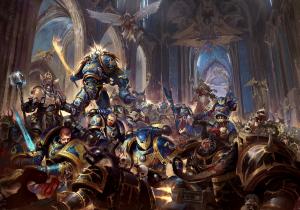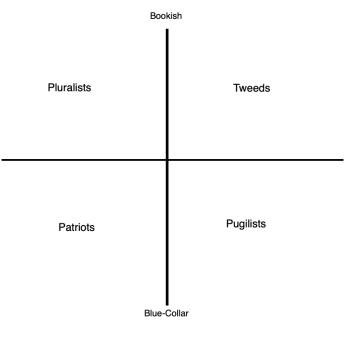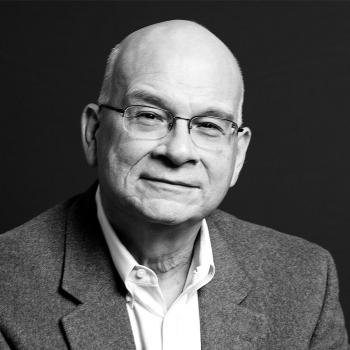
Science fiction stories generally fall into one of two categories. At one pole, there are the Star Trek tales—those intensely absorbed with the technical details of the distant future, committed to a vision of liberal humanism in which no problem is unsolvable by science. At the other pole are the Star Wars narratives—those built around the pursuit of otherworldly mysticism, willing to handwave aside the finer points of warp travel in the name of a grand, Joseph Campbell-style metanarrative. Essentially, these two paradigms stand for two competing philosophical perspectives on reality: the modern disenchanted universe, and the premodern kosmos rife with beauty and terror.
But the world of Warhammer 40,000, one of the richest and most intriguing sci-fi sagas on offer, refuses that classification altogether. I would go so far as to call it the first postliberal sci-fi—a tale that forces the conversation beyond the false binary of rationality and fantasy, and that asks questions neither current paradigm is equipped to handle.
While the depth and complexity of the franchise’s narrative is astonishing—spanning literally hundreds of thick novels—40k has been almost totally absent from discussions of the genre. This relative invisibility among mass audiences is probably due to the fact that the franchise has not yet produced a mainstream work of universally acknowledged artistic merit. There’s no blockbuster film or wildly popular TV series, nor are any of the novels likely to pick up Hugo or Nebula awards. Instead, the backbone of the franchise is tabletop wargaming, a hobby that resembles nothing so much as a very complex, very expensive form of toy soldiers for adults. (Similarly, its foremost digital incarnation—Dawn of War—is readily classifiable as a geekier version of StarCraft or Age of Empires.)
Nevertheless, the world of 40k is surprisingly well known among young men of a certain age, even those who’d never dare set foot in a “gaming store.” I even once enjoyed a delightfully unexpected conversation about 40K during a gala banquet at the New Haven Lawn Club. (Believe it or not, I was not the one who broached the subject.) And the owner of 40K’s intellectual property—the United Kingdom-based Games Workshop—continues to churn out new content at a breathtaking pace, suggesting that the saga is here to stay whether or not it attracts widespread popular attention. A devoted fanbase is a powerful thing.
* * *
Though the bulk of the saga is set during the “41st millennium” A.D., the backstory of 40K begins where many sci-fi tales end. Following the development and emergence of true artificial intelligence, the human race begins an unprecedented era of galactic expansion. But—as so often happens in stories like this—the machines turn against their creators, leading to an outbreak of pandemonium and mass violence that humanity barely survives. The development of artificial intelligences is subsequently anathematized, forcing a human element back into military decision-making.
Enter the “Emperor of Mankind”—a mysterious figure from the Himalayas with powerful psychic abilities. The Emperor unites the fractured remnants of humanity behind him and begins a “Great Crusade” across the galaxy, preaching the “Imperial Truth”: the creed that all religions are false and that it is the duty of humanity to enter into an enlightened era of secular reason.
But as it so happens, the Emperor’s metaphysics are wrong. Over thousands of years, the great besetting sins of humanity—sloth, rage, sorcery, and lust—have manifested physically in the realm of “warp space” known as the Immaterium, through which all vessels must travel if they hope to move at faster-than-light speeds. When the Immaterium starts vomiting forth daemons, living incarnations of moral evil, the Emperor’s secular creed can no longer explain the observed phenomena. Reductionist materialism must yield.
And so, following a brutal battle against a renegade scion pledged to the daemonic forces, the Emperor restyles himself as the God-Emperor of Mankind—a kind of nontheistic pontifex maximus, who also serves as the immortal ruler of the Imperium of Man and the linchpin of institutional continuity. Since the Immaterium manifests the beliefs and sentiments of human beings, faith in the Emperor’s providence proves to be the only real psychic bulwark against the daemons’ power.
Thus emerges a genuinely “integralist” regime, albeit of a distinctly immanentist sort. The Imperium of 40K reflects a full harmony between temporal and “spiritual” authority, in which the actions of the Imperium (the state) flow directly forth from the God-Emperor’s Ecclesiarchy (the church). No concept of deliberative or representative democracy is on offer; in extremis, with both alien and metaphysical threats behind every corner, the only hope for humanity is allegiance to a unitary religious power.
That is certainly not the stuff of traditional science fiction.
* * *
Though the broad shape of 40K’s narrative dates back to the 1980s, it is difficult to deny that the saga’s themes eerily foreshadow those of Charles Taylor’s magisterial 2007 volume, A Secular Age. Taylor’s work centers on the transition from the “porous self” of premodernity to the “buffered self” of modernity—the process by which individuals moved from thinking of themselves as participants in a world enlivened by spiritual powers to conceiving of themselves as solitary monads in a sterile cosmos, a landscape upon which humans must impress their own meaning. The porous self is capable of receiving divine grace in physical form—epitomized by the Sacraments—but is simultaneously vulnerable to attacks from enemy spirits ready to prey upon the unwary; the buffered self, by contrast, acknowledges no threats and no redemption.
What 40K styles as the collapse of the Imperial Truth—the emergence of the daemonic over against the Emperor’s stern materialism—is, at bottom, a kind of inbreaking of the sacramental imagination within a philosophically deracinated moment, the secular condition that Dietrich Bonhoeffer famously termed “a world come of age.” It is the instant in which the trillion “buffered selves” of the Imperium must come to terms with their porosity after all—a haunting inversion of Friedrich Nietzsche’s “Death of God” moment. If the daemonic is real, so too are traditional notions of good and evil.
40K’s characters do not respond identically to this reassertion of the “trans-rational.” Some react with fire and violence, as if metaphysical evil were something that could be vanquished with sufficient ordnance. Others fall back on pagan rites and rituals, attempting to contact primordial, pre-Imperial powers that may ward off destruction.
But one theme remains consistent: the only mode of the sacred that 40K allows itself to think is the immanent, the this-worldly. As Steven Smith explains in his recent Pagans and Christians in the City, there is a longstanding gulf between this form of belief and the “transcendent religiosity” of the Abrahamic faiths: the former eschews talk of the afterlife or the eschaton in favor of an exuberant celebration of finite life, while the latter treats temporal existence as a prelude to union with the eternal Good.
The world of 40K is strictly immanent in its theological orientation, utterly devoid of eschatological hope. In 40K’s grim vision, the “souls” of the dead pass into the Immaterium and become vulnerable to daemonic attack, such that persistence in life is the only real safeguard against the threat of unending hell. So too, the God-Emperor is certainly a kind of deity, but a purely finite one, far more akin to Zeus or Anubis than to YHWH or Allah. The Emperor may protect—in a temporal sense—but he certainly cannot promise with any meaningful guarantee of realization. Like the gods of pagan lore, he too may die in his own Titanomachy or Ragnarok, leaving the faithful adrift.
And more importantly, 40K simply sidesteps the core issues that the “transcendentalist” faiths engaged from the start. The spirituality of 40K’s Imperium is a system that apes traditional Christian forms—right down to the cathedrals, saints, and monastic orders— but that steadfastly refuses to address the traditional question of religious metaphysics: why is it that we are here, enduring what we are enduring?
* * *
Perhaps it is too much to demand thoroughgoing theological-philosophical rigor from a sci-fi franchise that began life as a glorified board game. In any event, it seems to me that the persistent appeal of 40K reflects an abiding hunger for storytelling that refuses to shy away from the hard questions of belief and politics, that declines to deem human progress an unalloyed good or treat secularity as historically inevitable. As R.R. Reno might put it, the “strong gods” of religious faith and group allegiance will continue to assert themselves over against a totalizing liberalism that refuses to engage “ultimate questions.” The development of Western politics in the last decade—and the emergence of various populisms that place these issues front-and-center—puts paid to the notion that these questions have been forever settled.
Considered in isolation, 40K may seem to have few resources to offer the philosophical conservative. Its concept of sacredness coheres uneasily with the Western tradition, its characters and stories are thinly drawn, and its development is colored by the omnipresent profit motive of Games Workshop.
But all that aside, the 40K story carries with it a distinctive power, the significance of which becomes clear only upon reflection. 40K refuses to treat the relationship between the porous and buffered self as unidirectional, forever inclined toward secularity—and in so doing, the saga opens up the possibility of acknowledging values that transcend the parameters of contemporary public discourse.
And so, to the extent the enduring popularity of 40K carves out space for an account of truth, goodness and beauty that goes beyond the mere assertion of private preference, that strikes me as something well worth pondering.












